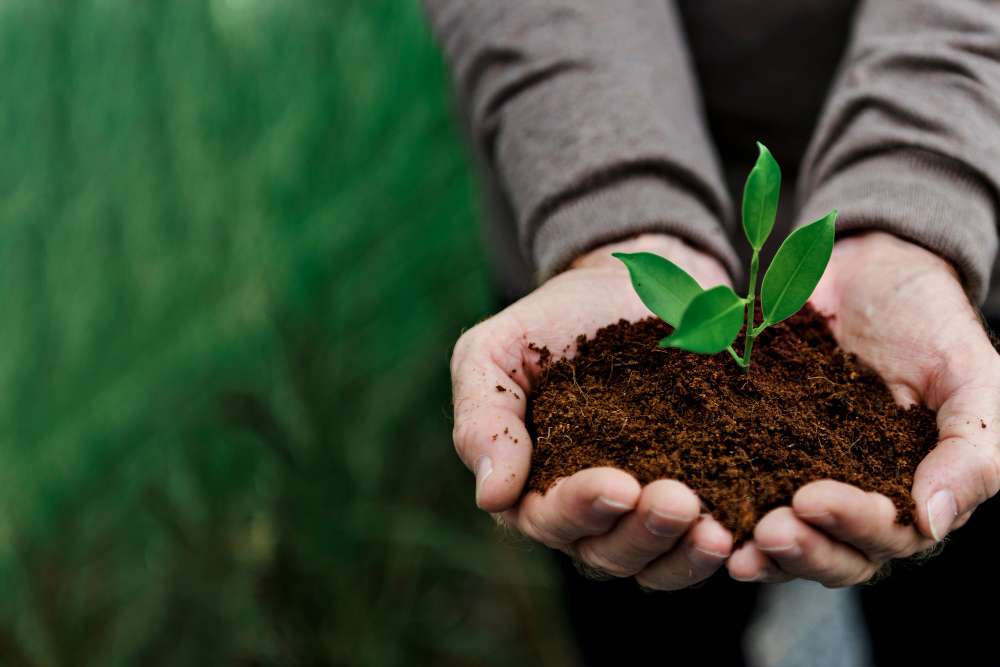Sustainable living is the practice of reducing your environmental impact and enhancing your personal well-being by making eco-friendly choices at home. By adopting a green lifestyle, you can not only help conserve natural resources, reduce waste, and lower your carbon footprint, but also save money, improve your health, and increase your happiness.

In this blog post, we will share 10 easy tips for living sustainably at home, covering various aspects such as cleaning products, lighting, kitchen practices, water conservation, shopping habits, transportation options, gardening practices, and waste reduction strategies. By following these tips, you can make small changes at home that will make a big difference for the planet and yourself.
Eco-Friendly Cleaning Products
Many conventional cleaning products contain harsh chemicals that can harm the environment and your health. These chemicals can pollute the waterways, damage the ecosystems, and cause skin irritation, respiratory problems, and allergic reactions.
To avoid these harmful effects, you can switch to eco-friendly cleaning products that are made from natural ingredients or certified by reputable organizations. You can also make your own homemade cleaners using common household items such as vinegar, baking soda, lemon, and salt. These cleaners are effective, safe, and cheap.

Energy-Efficient Lighting
Traditional incandescent bulbs and fluorescent lights consume a lot of energy and emit greenhouse gases that contribute to global warming. They also have a short lifespan and need to be replaced frequently, creating more waste.
To reduce your energy consumption and greenhouse gas emissions, you can switch to energy-efficient LED bulbs that use up to 80% less energy and last up to 25 times longer than incandescent bulbs. LED bulbs also produce less heat and have a better color quality.
Sustainable Kitchen Practices
One of the biggest sources of waste at home is food. According to the United Nations, about one-third of the food produced in the world is wasted, which has a huge environmental and social impact.
To reduce your food waste, you can adopt some sustainable kitchen practices, such as:
- Meal planning: Plan your meals ahead and buy only what you need. This will help you avoid impulse buying, overstocking, and throwing away expired or spoiled food.
- Composting: Compost your food scraps and organic waste, such as peels, cores, eggshells, coffee grounds, and tea bags. This will reduce the amount of waste that goes to the landfill and create a rich fertilizer for your plants.
- Using reusable storage containers: Store your leftovers and food items in reusable containers, such as glass jars, metal tins, or silicone bags. This will help you preserve your food longer and avoid using plastic wrap, foil, or disposable containers.
You can also use eco-friendly kitchen utensils, dishes, and appliances that are made from sustainable materials, such as bamboo, wood, stainless steel, or ceramic. These products are durable, biodegradable, and non-toxic.
Water Conservation Techniques
Water is a precious and finite resource that we often take for granted. However, excessive water usage can have a negative impact on the environment, such as depleting the groundwater, disrupting the water cycle, and increasing the energy demand.

To conserve water and protect the environment, you can implement some simple water-saving techniques at home, such as:
- Fixing leaks: Leaky faucets, pipes, and toilets can waste a lot of water over time. Fixing them as soon as possible can save you money and water.
- Installing low-flow faucets and showerheads: Low-flow faucets and showerheads can reduce the water flow by up to 50%, without compromising the water pressure or quality. They are easy to install and affordable.
- Using rainwater harvesting systems: Rainwater harvesting systems can collect and store rainwater from your roof, gutters, or other surfaces. You can use this water for watering your plants, washing your car, or flushing your toilet.
Eco-Friendly Shopping Habits
When you go shopping, you can make a positive impact on the environment by prioritizing sustainable and ethically sourced products. These products are made from renewable, recycled, or organic materials, and have a minimal environmental footprint. They also support fair trade, animal welfare, and social justice.
To adopt eco-friendly shopping habits, you can follow these tips:
- Reducing packaging waste: Packaging waste accounts for a large portion of the trash that ends up in the landfill or the ocean. To reduce packaging waste, you can opt for products that have little or no packaging, or use recyclable or compostable packaging. You can also bring your own reusable bags, containers, and bottles when you shop, and avoid single-use items such as plastic bags, cups, and straws.
- Buying in bulk: Buying in bulk can save you money and reduce packaging waste. You can buy items such as grains, beans, nuts, seeds, spices, and dried fruits in bulk, and store them in your reusable containers. You can also buy household items such as toilet paper, soap, and detergent in bulk, and refill your existing containers.
- Choosing local and seasonal products: Local and seasonal products are fresher, tastier, and more nutritious than imported or out-of-season products. They also have a lower environmental impact, as they require less transportation, refrigeration, and storage. Buying local and seasonal products can also support your local farmers and economy.
Green Transportation Options
Transportation is one of the major contributors to air pollution and climate change, as it emits a large amount of carbon dioxide and other greenhouse gases. Personal vehicles, such as cars and motorcycles, are especially harmful, as they consume a lot of fuel and produce a lot of emissions.
To reduce your carbon footprint and improve the air quality, you can choose green transportation options, such as:
- Walking or biking: Walking or biking is the most eco-friendly and healthy way to get around, as it does not use any fuel or emit any emissions. It also helps you exercise, relax, and enjoy the scenery.
- Carpooling or using public transportation: Carpooling or using public transportation can reduce the number of vehicles on the road, and thus the amount of fuel consumption and emissions. It can also save you money, time, and stress.
- Reducing your vehicle usage: If you own a vehicle, you can reduce your vehicle usage by driving less, driving more efficiently, and maintaining your vehicle regularly. You can also consider switching to a hybrid or electric vehicle, which uses less or no fuel and emits less or no emissions.
Sustainable Gardening Practices
Gardening is a rewarding and enjoyable hobby that can also benefit the environment and your well-being. By creating a sustainable garden, you can enhance the biodiversity, improve the air quality, and boost your mental health.
To create a sustainable garden, you can follow these practices:
- Using native plants: Native plants are plants that are naturally adapted to your local climate, soil, and wildlife. They are more resilient, require less water and maintenance, and attract more pollinators and beneficial insects.
- Using organic gardening methods: Organic gardening methods are gardening methods that do not use synthetic fertilizers, pesticides, or herbicides. They are safer for the environment, your health, and your plants. You can use organic gardening methods such as mulching, composting, crop rotation, companion planting, and natural pest control.
- Using water-efficient irrigation techniques: Water-efficient irrigation techniques are irrigation techniques that use water wisely and avoid wastage. You can use water-efficient irrigation techniques such as drip irrigation, rain barrels, soaker hoses, and timers.
Waste Reduction Strategies
Waste is one of the biggest environmental problems that we face today, as it pollutes the land, water, and air, and contributes to climate change. A lot of waste comes from single-use plastics and disposable products, such as bottles, bags, cups, plates, cutlery, and napkins.
To reduce your waste and protect the environment, you can use these alternatives:
- Using reusable bags, bottles, and containers: Reusable bags, bottles, and containers can replace single-use plastics and disposables, and help you reduce your waste and save money. You can use them for shopping, storing, and carrying your items.
- Practicing recycling and composting: Recycling and composting are processes that turn waste into useful materials. Recycling can turn waste such as paper, glass, metal, and plastic into new products, while composting can turn organic waste such as food scraps and yard trimmings into fertilizer. By recycling and composting, you can divert waste from the landfill and conserve natural resources.
Conclusion
Living sustainably at home is not only good for the environment, but also for yourself. By making eco-friendly choices at home, you can reduce your environmental impact, save money, improve your health, and increase your happiness.
You don’t have to make drastic changes or sacrifice your comfort or convenience to live sustainably at home. You can start with small steps and gradually adopt a greener lifestyle. Every little action counts and makes a difference.
We hope this blog post has inspired you to live sustainably at home and given you some practical tips to do so. Remember, you have the power to make a positive change for the planet and yourself. So, what are you waiting for? Start living sustainably at home today!